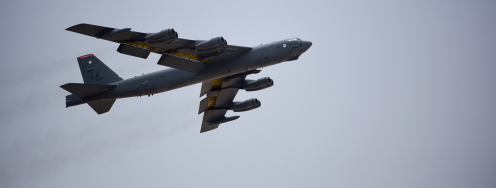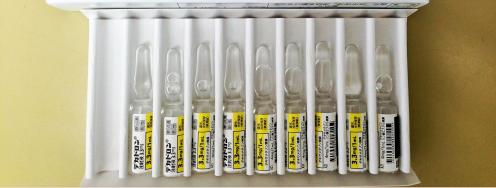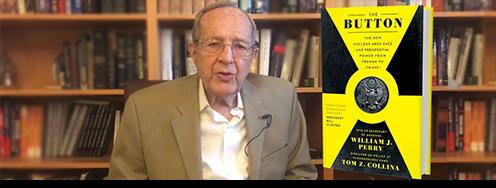Second Chance to Secure Nuclear Materials
On the radar: Beyond summits; Finding bombs; Monitoring meteorites; No first use; Deterrence summit; Regional views on N. Korea; and Atomic scientists on ice.
On the radar: Beyond summits; Finding bombs; Monitoring meteorites; No first use; Deterrence summit; Regional views on N. Korea; and Atomic scientists on ice.
February 20, 2013 | Edited by Benjamin Loehrke and Alyssa Demus
Loose nukes - While “modest progress has been made” towards achieving President Obama’s first-term promise of securing nuclear materials and preventing nuclear terrorism, the U.S. is “only marginally safer from that threat today than it was” four years ago. Now is the time for the president to make good on this first-term commitment, says the Fissile Materials Working Group at The Bulletin of the Atomic Scientists.
--”Obama must direct his administration to lead efforts to develop a robust global nuclear security regime that can be operative by 2020.” Recommendation: Use the 2014 Nuclear Security Summit in the Netherlands to create a new framework with legally binding requirements for securing nuclear materials. Full article here. http://goo.gl/rpY7C
Finding nukes - The Defense Threat Reduction Agency (DTRA) announced it will conduct research to explore alternative technologies used to detect nuclear weapons. DTRA “wants to develop unconventional ‘non-radiation indicators of nuclear WMD-related behaviors and activities,” and is turning to sensors that can “study changes in the ground.”
--The agency’s “turn away from atmospheric radiation detection underscores a shift in [the way nuclear devices] are developed,” and will ideally tell the agency where a nuclear threat will be, rather than where its been reports Spencer Ackerman at Danger Room. http://goo.gl/8ukJ2
Tweet - @Gottemoeller: U.S.-#Russia agreed on the number of ICBM & SLBM launches on which telemetric information will be exchanged in 2013. http://bit.ly/ZrICGE
Welcome to Early Warning - Subscribe to our morning email or follow us on twitter.
--Have a tip or feedback for the editor? Email earlywarning@ploughshares.org earlywarning@ploughshares.org. Want to support this work? Click here.
Podcast - Amb. Thomas Pickering and Kenneth Pollack discuss “Iran’s Nuclear Program: Is a Peaceful Solution Possible?” at the Brookings Institution. Listen to the talk here. http://owl.li/hSID4
The blast felt round the world - Last week’s meteorite blast in Russia was the largest event ever registered by the Comprehensive Test Ban Treaty Organization’s network of infrasound sensors, one of the organization’s methods of detecting nuclear explosions. The same system detected North Korea’s nuclear test just days before.
--Infrasonic waves from the meteorite’s blast registered on 17 of the network’s 45 infrasound stations, including a station in Antarctica. Leonard David of Space.com has the story. http://goo.gl/yJjka
First use - Current U.S. nuclear posture preserves an option of using nuclear weapons first against states not in compliance with the Nonproliferation Treaty. Yet, the U.S. has the most to gain if it were to adopt a no first use policy, writes John Arquilla in Foreign Policy. Full story here. http://goo.gl/jLA6R
Tweet - @wellerstein: WOW: Trinity site base camp was accidentally bombed in May 1945 http://goo.gl/8Ottu
Deterrence, live streaming - Experts in the field discuss nuclear deterrence issues under fiscal constraints at the annual Nuclear Deterrence Summit. Watch the summit live here without the hefty price tag for admission. Speakers include: Under Secretary Rose Gottemoeller, Deputy Secretary Daniel Poneman, Maj. General William Chambers, Acting Administrator Neile Miller and others. http://owl.li/hSJqC
Asan forum recap - The future of U.S. policy towards North Korea was the topic du jour at the 2013 Asan Nuclear Forum’s first day. Experts discussed steps forward and offered suggestions for reengaging Pyongyang diplomatically. Kelsey Davenport at Arms Control Now offers an overview of the first day’s talks.
-- Major themes and recommendations: better align threat perceptions and priorities among countries involved in negotiations with N. Korea; “improve coordination and enforcement of sanctions”; and include political and economic issues in discussions. Experts also agreed that China was in a unique place to influence North Korea’s behavior reports Davenport. http://goo.gl/mCnbT
Events:
--”North Korea and Iran:The 21st Century’s Cuban Missile Crisis?” Joe Cirincione, President of Ploughshares Fund. February 21, 12:00-1:45 p.m.@ Rivers Club, 301 Grant St., Pittsburgh. Register here. http://owl.li/hQKh0
--”Iran Nuclear Talks - What Can Be Achieved in 2013,” Featuring Amb. Thomas Pickering, Seyed Hossein Mousavian, Alireza Nader and Daryl Kimball. February 25 2:00-3:30 pm at the Carnegie Endowment. http://bit.ly/XK3XYV
--”After North Korea and Iran: How Much More Say Should Congress Have on U.S. Nuclear Exports?” Jay Solomon, Jack Spencer, Jodi Lieberman and Don MacDonald. February 25 11:45 a.m.- 1:30 p.m. @Rayburn House Office Building. RSVP here. http://owl.li/hQKOK
Dessert:
Spring break? - Perhaps with a great appreciation of puns, North Korea’s state media agency says tourism is “booming.” Alexander Abad-Santos at The Wire has the story. http://goo.gl/mw0rj
Guess they couldn’t go to Disneyland - In similar news, scientists that worked on North Korea’s nuclear test will be rewarded for their efforts with a “fun-packed” visit to Pyongyang, announced KCNA. Their agenda, which promises a “joyful and delightful time,” includes a visit to the city’s open-air ice rink and roller skating arena reports the Global Post. http://goo.gl/m7Fyf



